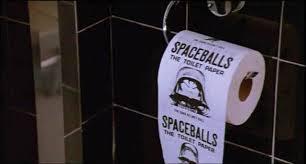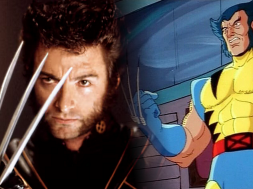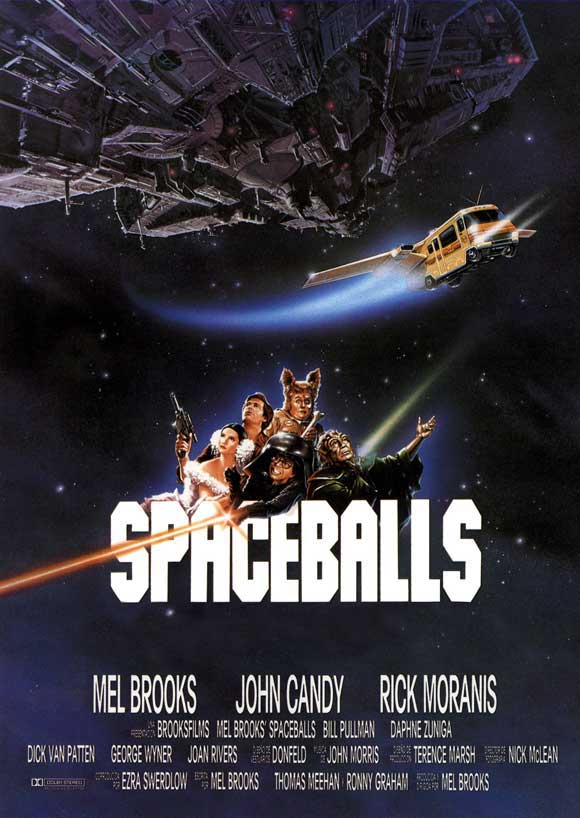With Mel Brooks confirming a second Spaceballs, the first demands a second look. Originally released 1987, the film is a spoof, mocking sci-fi tropes and the franchise mentality alike. Spoilers ahead.
 The spoofing starts right at the off, with an episodic script that recalls the beginning of Star Wars, the sci-fi franchise of franchises. The use of music and distended tension (intentional overblown) continues into the sequence introducing Spaceball One and Dark Helmet (Rick Moranis) shortly thereafter. But now I am getting ahead of myself, as a much loved film/book/show is want to get any of us.
The spoofing starts right at the off, with an episodic script that recalls the beginning of Star Wars, the sci-fi franchise of franchises. The use of music and distended tension (intentional overblown) continues into the sequence introducing Spaceball One and Dark Helmet (Rick Moranis) shortly thereafter. But now I am getting ahead of myself, as a much loved film/book/show is want to get any of us.
The story is simple enough. Planet Spaceball is running out of air and seeks to hijack that of it’s peaceful neighboring planet Druidia by kidnapping its Princess, Vespa (Daphne Zuniga). The only way the save the Princess and therefore the planet is to enlist the help of an outcast, the Winnebago flying space cowboy, Lone Star (Bill Pullman), and his side-kick Barf (John Candy).
Now before we go on we have to address a certain pachyderm. A sci-fi film that ribs sci-fi is warrant to annoy those who enjoy said sci-fi (I can’t bring myself to say sci-fi enthusiasts, so parochial). Of course, such a warning must be tempered by the fact that were all different; indeed the warning cannot be applied unilaterally without conforming with the tired old stereotype that nerds are indistinct, all subject to deficient humor. Still there are fan-boys/girls who may take against the film for its treatment of much loved subject-matter(s). Plot exposition, creaky dialogue, liberties taken with science fact and corporate merchandising: these are all staple conceits of the popcorn sci-fi adventure and here are all subjects of fun. However, the film’s comedy is entirely in keeping with science fiction as a genre. Science fiction is well-known as a means of contemporary commentary, which is precisely why in this film it makes such a perfect bedfellow with satire. In fact, the film’s treatment of issues such as the environment and autocratic regimes is what gives it continued prescience. Much like time honored stand-up routines from the likes of Bill Hicks and Richard Pryor, and the body of Mel Brooks’ other filmic exploits, the truly well written reflective satire lands because truly well written satire struggles to find irrelevance.
Even so, the star of the show is neither Brooks nor Pullman. It’s the script. Spaceballs was written with a stand up’s sensibilities. There is the plentitude of puns. There are tertiary characters like the soporific Prince Valium or space gangster Pizza the Hutt; throw-away lines like “Snotty, beam him down”. As you can guess, I could be here a while. Still, that would defeat the object for those who are as yet uninitiated. Then again, that’s the problem with reviewing comedy: it’s difficult to do without entirely giving away the game. Suffice to say, it’s pundemonium.
Still, for those that know Brooks the film is what one would hope for. Behind the pratfalls and high jinx that some might (dubiously) term zany,  Spaceballs is ultimately irreverent, questioning the powerful and the pompous. The film has a triumvirate of baddies: a Yes Man, a thug, and a politician, played respectively by George Wyner, Rick Moranis and Brooks himself. The combined incompetence of these three ridicules the stupidity of totalitarian, militaristic rule. It is worth noting that Brooks’ lampooning the of rank-and-file order of the war-like Spaceball is likely based on first-hand experience from when he was drafted (he was Corporal Brooks, after all).
Spaceballs is ultimately irreverent, questioning the powerful and the pompous. The film has a triumvirate of baddies: a Yes Man, a thug, and a politician, played respectively by George Wyner, Rick Moranis and Brooks himself. The combined incompetence of these three ridicules the stupidity of totalitarian, militaristic rule. It is worth noting that Brooks’ lampooning the of rank-and-file order of the war-like Spaceball is likely based on first-hand experience from when he was drafted (he was Corporal Brooks, after all).
However, the film’s other figure of fun is the big budget science fiction blockbuster itself. The film often breaks the fourth wall to expose the plot holes and cliches in so many movies abound. More than that, Spaceballs routinely recalls its fictional status by filling the screens with movie merchandise. There comes a point where a film can become less a thing in itself and more an exercise in making money. The reductio ad absurdum lengths the merch goes to (SPACEBALLS THE TOILET PAPER) demonstrates the problem of such rampant commodification. Yet the film is not preachy, and neither does it forget to be funny. A lesson in matching humor with relevance and vice versa.
Snappy and satisfying. 8/10










